January 2016
How to Take a Real Vacation While Running Your Own Business
- by Alyson Shane
With my Central American vacation extravaganza coming up tomorrow (gulp!) , I've been experiencing a higher than usual degree of anxiety around my business. This will be the first time that I'll really be "away" from my work in any real capacity, and I'm starting to realize why only 9% of the 200 business owners interviewed in a survey by OnDeck allowed themselves to take a full two-week vacatio.
This is really distressing news! Relaxing and taking a break is crucial to being productive and happy, and it provides much-needed downtime away from all the screens and stresses of everyday life. Even better, with recent advances in technology business owners can work from virtually anywhere, meaning that they can check in and give themselves peace of mind that their hard work isn't crumbling to pieces while they're on the beach.
However, in order to go away on a vacation and not lose your mind, there are a few steps that you can take to help alleviate anxiety and keep things running properly while you're away. Here are some which have helped me:

1. Have someone you trust step in for you
If you manage a business with a few employees, then speak to one of them about handling some of your more pressing duties. Having someone that you trust, whom you know can handle themselves in a crisis and won't burn your business to the (figurative) ground will go a long way towards making sure you aren't stressing out the entire time you're gone.
In my case, I'm getting someone I trust to handle my client's accounts while I'm away. I've planned out as much content in advance as I can, and made my clients aware of a very strict cutoff date for info pertaining to pressing ads and marketing campaigns, so that way all that person has to do is a bit of community management (ie: replying to Tweets and comments as needed).
2. Communicate your expectations
If you run a service-based business like I do, communication is key. This is great day-to-day advice, but is especially applicable when you're about to go away on vacation. Keeping your clients or customers in the loop goes a long way towards building trusting relationships, and helps set their expectations as to what you can reasonably do while you're away.
To illustrate: last week after the holidays ended I sent all of my clients an email with a friendly post-holiday message, and a reminder that I'm going out of town. Now they know the exact dates I'm leaving and returning, as well as the final submission date for any content they need created or scheduled. I also asked them to think of any upcoming events or promotional opportunities, and to let me know ASAP so I that I can plan ahead to make sure nothing gets missed.
I also let them know that, while I will be checking my email from time to time, I'll be in the jungles (or beaches!) of Central America and have no idea what the wifi will be like, so it may take me a few days to respond. By communicating expectations in advance, both parties know what to expect.
If you have employees, make them aware of what you expect them to do while you're away. Having a checklist or defined list of tasks and goals can go a long way towards helping them stay motivated in your absence, and defines clear expectations so there's no confusion.
3. Set boundaries
The point of a vacation is to peel yourself away from your screen.
As someone who literally makes their living online, I know that I'm going to struggle to not keep my face buried in my iPhone screen the entire time, and honestly this is giving me some anxiety.
I'm lucky that a lot of the places we're going will probably have pretty slow, spotty wifi, which will help force me off my phone, but if you're going somewhere with a strong connection, like a resort or somewhere that isn't in the middle of the Guatemalan jungle, then setting rules like "I only check my email in the morning over coffee" can go a long way to keeping you sane.
Not just that, but having a rule for when you "check in" can also help your clients and employees (if you have them) know when to expect to hear from you, and when the best time to get in touch with you will be.
4. Use collaboration tools & group chats
There are a variety of collaboration tools online such as Slack, Asana, Evernote, BaseCamp, and Trello (my personal fave) which you can use to stay in the loop about various projects and opportunities. By making the most of these tools you can communicate and catch up with your team or clients quickly and effectively, leaving more time to hang out and relax.
In the event of a crisis, tools like Google Hangouts and Skype are great for having a quick chat to solve the problem. This can work great for employees who are stressed out during a crisis, or a client who is having a meltdown while you're on another continent.
How do you keep from going crazy when you go away on vacation? Tell me in the comments!
How to Create a Value Proposition That Stands Out From the Crowd
- by Alyson Shane
One of the cornerstones to running a successful business is having a strong value proposition.
Not sure what the heck a "value proposition" is? Here's a breakdown:
- It explains how your product or service solves your clients’ problems
- It highlights specific benefits of working with you
- Explains why working with you is a better option than working with your competitors
Understanding these three key things can go a long way towards building your business, helping you find and retain the kinds of clients and customers you want, and goes a long way towards quoting accurately and not selling yourself short (which many people I meet tend to do, it seems).
Despite it's importance, many of the people I've met either don't know how to create one, or don't understand the steps to creating an effective one which helps their business forward.
Today, we're going to fix that:
Understanding Your Value
This is tougher than it sounds. For many of us (myself included) our businesses happen as the result of a series of opportunities which may leave us feeling unprepared and confused. This is normal.
When I first started out I knew a few things: I knew what I loved to do (writing, content marketing, and community management) and I knew why my clients wanted to work with me (strong writing skills, good attitude, deep knowledge of my industry), but I struggled to clarify what the value of what those things actually meant to my clients. This takes some serious thought and reflection, and it's okay if you don't know right away.
Some things to ask yourself are:
- What am I exceptionally good at?
- What makes me and my business unique?
- What does a one-sentence summary of how I help my clients/customers look like?
Get to Know Your Ideal Client or Customer
Take a step back from your own train of thought for a second and think like your ideal client or customer, then ask yourself the following questions:
- What do they do?
- What kinds of problems do they have that I can help solve?
- How can my services or product help make their lives easier?
- What do they value?
Not sure how to answer these questions? Ask and do some market research! You can accomplish this in a variety of ways: conducting a Twitter poll, asking friends and colleagues, talking to your mentor - the sky's the limit!
Creating an Eye-Catching Value Proposition
Business is about being different. The more you can stand out from your competitors, the stronger your value proposition will be.
Here's what my value proposition looks like:
I help brands and businesses create long-term content marketing strategies which help them convey the right message to their target audience.
Let's break this down:
- I've identified the kinds of clients I want
- I've stated the kind of work I want to do (copywriting, content marketing, and social media management)
- I've described the kinds of working relationships I want (long-term ones)
- I tell prospective clients how I help them (increasing brand awareness and community growth)
Creating a value proposition which states what you do, what makes you different, and the kinds of clients and working relationships you want to have doesn't just tell your clients about what you do, but it also helps you determine if a potential client or customer is the right fit for you, saving you time in the long run.
Adding Social Proof
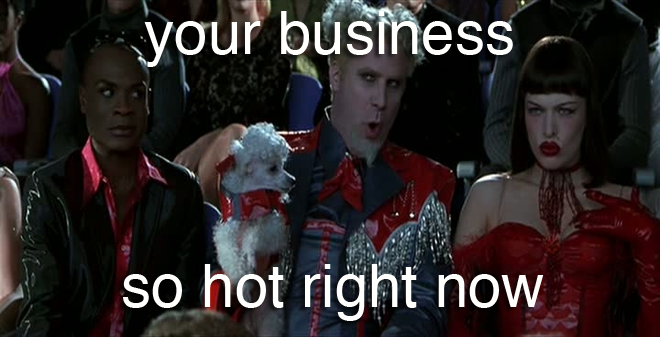
Do you have any accomplishments that you're proud of?
Maybe you were published in your local paper, received an award for excellence in your field, or spoke at a conference - whatever it is, feel free to weave these into your value proposition when you can.
This is called "social proof" and is designed to add to your value proposition in terms of concrete examples of how awesome you and your business are.
You can add things like "voted #1 in my field" or "nominated as 2015 Canadian copywriter of the year" - whatever it is (as long as it's true!) can go a long way to adding weight to your value proposition.
Now it's your turn!
Ask yourself what you want to do, how you'll do it, and how your approach makes you different than other people and businesses in your industry. Got questions? Leave them in the comments or drop me a line!
In My Community: SPIN (or, I saw the strangest play last night)
- by Alyson Shane
Last night, despite frigid temperatures and hostile winds, John and I trekked out to the Prairie Theatre Exchange to check out the opening night of SPIN, an unusual spoken-word, musical, theatrical oddball of a play featuring a string section, two guitars, a projector, and a bicycle as an instrument.
It was by far the weirdest play I've ever seen, and I totally loved it.
For those of you who don't know me personally, I'm obsessed with riding my bike. I first got into cycling as an adult when the guy I was seeing at the time and I purchased matching his & hers vintage road bikes for $40. They were named Vikki & Vance, and I loved them.
A few years later an unfortunate (car) accident led to me purchasing my current velocipede, Barbara Streisand, whom I now ride all over town the moment the weather allows it. I love cycling; it's an amazingly freeing and fun activity, and there are literally few things that I love more than riding my bike around on a warm day in the sunshine.
So, naturally when I was offered free tickets to see SPIN, a play about cycling, I jumped at the opportunity.

What's so good about a play about the bicycle?
What I didn't know about the bicycle before attending the play was this: the bicycle, in fact, was an important instrument for social change during the women's suffrage movement.
At the opening of the play, which is sort of a mash-up of ballads, catchy songs, and spoken-word pieces, Evalyn Parry emerges and does an impressive recital of Instructions on Learning to Ride a Bicycle, a pamphlet published by Miss Frances Willard, one of the most important suffragettes in history. After learning to ride a bicycle at 51 years old, she was so taken with this efficient mode of self-transportation that she wrote a pamphlet about it, declaring that "all women must all learn to ride, or fall into the sluiceways of oblivion and despair."
Wow. It definitely puts getting on my bike and rollin' around town feel a little less frivolous.
Not only are the stories that Parry weaves together hilarious, fascinating, and inspiring, but her vocals and guitar are backed up by... you guessed it, a bike. Brad Hart, Parry's accompanist who sports a fitting handlebar moustache, literally brings a vintage CCM bicycle to life by playing it like an instrument, suspended on a stand and connected to contact microphones.
The variety of sounds Hart can produce on a bicycle is, to say the least, a little mind-blowing. By using a combination of drum sticks, tuned bells, the spokes, frame, seat, and even the wheels themselves, he adds a unique and fitting element to Parry's songwriting.

The bicycle as an instrument of social change
SPIN is inspired in part by the amazing true story of Annie Londonderry, the first woman to ride around the world on a bicycle in 1894. Not only was 23 year old Annie Londonderry (not her real last name, Londonderry Lithia was a mineral water manufacturer who sponsored her ride) unusual in that she accepted this unusual challenge, leaving her three kids and husband behind in Boston, but what I found striking (and ingenious) was that she scheduled press events everywhere she went. She sold advertising space all over her clothes and her bike - what a hustler!
This is just one of the examples that Evalyn Parry uses to illustrate how important the bicycle became to women in the late nineteenth century; for the first time ever women had a quick, easy, and most importantly an independent method of getting around.
The bicycle did more than just give ladies a way to get around, however: it also changed the way that we dressed. Using Annie Londonderry as an example of this sartorial shift, Parry paints a hilarious scene of Londonderry riding into a city and blowing people's minds with her masculine attire and her penchant for not giving a damn about it, thank you very much.
"Taking your life into your own hands"
One of the recurring themes throughout the play is the idea that the rider is connected to the bicycle, and that it allows them the freedom to go where they want, whenever they want, on their own terms. Parry weaves the idea of using your heart to move yourself around on your bike, and the idea that the bicycle and all it represents is connected to you as you ride around, beautifully.
"Taking your life into your own hands" also has a double meaning, referring to the suffragette movement and women's rights. As Parry points out throughout the play women's rights are the result of women "taking their lives into their own hands" and not allowing it to be dictated by men, and that the bicycle was one of the first ways in which women were able to start asserting their own independence in stodgy Victorian society.
Two-wheeled words/to wield words
To be honest, when I agreed to see the play I didn't quite know what I was signing up for, but I certainly didn't expect a cabaret-style, spoken-word/musical history lesson on women's rights featuring a bicycle as a backup instrument.
More importantly, however, SPIN made me appreciate what it means to be able to put on my pants and hop on my bike to go do whatever I please. As a woman who gets to enjoy a lifestyle which is a direct result of the hard work of so many women before me, it felt good to have the opportunity to develop a deeper appreciation for something that I already love so much (cycling).
In fact, I was so impressed by the play that it made me want to pull Barbara our, slap some giant winter tires on her, and ride that girl all around town. And in the middle of a frigid Winnipeg winter, that's saying something.
SPIN runs at the Prairie Theatre Exchange until January 31st. Grab your tickets here.
Your Guide to Being Productive as Hell + a Free Daily & Weekly Planner!
- by Alyson Shane
It's the dead of winter here on the prairies, which means that lately I've been waking up to dark skies, chilly mornings, and basically battling the near-overwhelming urge to stay in bed like a big cinnamon bun.

The summer months are my "power months." I find that, especially around this time of year as things get colder and darker, my productivity levels tend to drop. I feel much less inclined to sit at my desk and power through work, and my motivation tends to dip significantly.
Back when I worked in an office there were systems in place to keep employees motivated and on-track, which helped tremendously, but now that I run my own business I need spend the time to develop systems that fit my needs and help keep my motivated and productive.
That's what this post is about: productivity, getting shit done, and staying motivated.
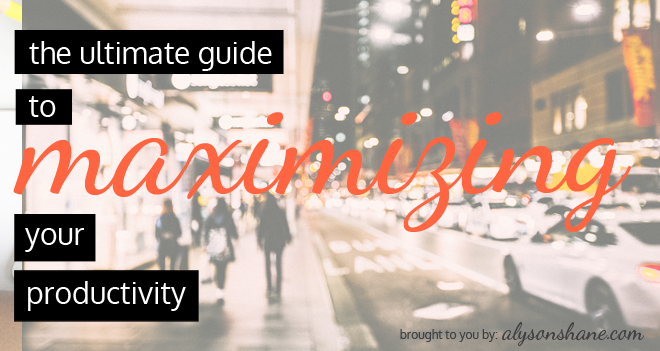
Some insight: what my days look like
Before I go too deep into what to do, let's take a quick look at what my day looks like, and how I make major dents in my to-do list every day:
Here's how my day usually looks:
- Wake up around 7, shower, make coffee
- I've recently started imposing a strict "no email" rule until after I get out of the shower. I used to read emails and find myself getting anxious at the time in-between getting ready and responding, and nobody needs that shit first thing in the morning. Now I wake up, shower, and mentally prep myself for my day before I check my emails. I also subscribe to Danielle Laporte's Truthbombs, which help me start every day on a positive, reflective note.
- Hit the gym
- I hit gym 2-3 times a week. I like to go in the mornings because it isn't as busy, and because I'm not a "morning person" I generally don't lose that much time where I would have otherwise been productive. I'm usually home around 9-9:30am.
- Check my email and read, respond to & file emails
- Once John is out the door (or I'm back from the gym, depending on the day) I park myself at my desk with my thermos of coffee and power through my email. Everything is responded to, taken care of, read/deleted, and filed away.
- Check off any "quick tasks"
- The first things I take care of are anything which take 15-20 minutes just to clear my plate. Generally this includes finding relevant content for clients, checking their messages/responding to new comments, reading any articles pertinent to what I'm doing, and scheduling a bit of my own content, too.
- Take care of my "priority tasks" first
- Once all my smaller tasks are complete I get to the most pressing task of the day; you know, the stuff that has a tight deadline that needs to get done. Because I know my productivity increases as the morning goes on, this usually starts around 10am and lasts uninterrupted until 1pm or so.
- Eat lunch and catch up on news
- I'm bad at taking breaks when I get into something, especially writing, but I try to make a point to stop and have a snack or some lunch in the early afternoon. I'll also take this time to read anything I have on the back burner, check Twitter, and walk around the house, harass the cats a bit, and stretch.
- Power through the other two or three "secondary tasks" on my to-do list
- Generally I try to leave really writing-intensive tasks for the afternoon, so most afternoons I spend writing content, working on blog posts for clients, or doing business-related projects.
- Set up my to-do list for the following day
- The last thing I do every day is review and write out my to-do list for the next day. That way I can sit down in the morning and see what my purpose-driven mind prioritized the day before.

On any given day I work between 6-8 hours, though there are of course times when I go over, like if a client needs me to attend an event for them, or if there's a large project with a tight deadline. Sometimes, too, I just want to keep working, so I do!
I find that the days that I go to the gym are generally my most productive days. I that that this is because I'm doing something at the start of my day which requires 100% of my attention and focus, and gets my endorphins going.
Additionally, I definitely have days where I'm working like crazy, responding to a billion emails and phone calls, and spending all of my day doing things outside of my to-do list. That's normal. However, by slowly learning to optimize my time and allowing myself to develop a system that works for me, I can manage my time in a way that allows me to be super-productive without over-working myself and going crazy.
So now that you have a better idea of how I manage my day, it's time to start talking about how you can kick ass, take names, and maximize your productivity!
Track how you spend your time
I use Toggl religiously to help me keep track of where I'm spending my time each week. This goes for client stuff - I'm detailed down to which specific task I'm doing, and for which client - as well as my own business development. It can be hard to track for smaller tasks like responding to tweets or comments that pop up, but I do my best to keep track, and round it all up at the end of the week.
By reviewing my time and where it's going, I can identify things that take me longer than usual (scheduling lots of content in advance, reports, etc) and schedule in "distraction-free" time. I'm pretty good at managing this - usually having a separate window open with just the tabs I need to complete a specific task work for me, but if you need you can use products like StaFocused and Anti-Social.
Use the alarms in your calendar
I schedule everything into my iCalendar, and rely heavily on alarms which I set 20-30 minutes before I have to leave/be somewhere so that I can work uninterrupted, and actually focus on what I'm doing, rather than constantly checking the clock to make sure I'm not late.
I also use this to keep track of things like Twitter chats and Skype and phone calls, meaning I always know when a client is going to call, or when I need to be ready to moderate or participate in a chat. This means I can focus, distraction-free, on my work until right before I need to switch focus.
Set realistic expectations
This relates to my earlier point about tracking your time: understanding how much you can reasonably get done in a day, and letting go of the expectation that you have to be blindingly busy 100% of the time, can make a huge different not only in your happiness level, but also impact how productive you are. Worrying about being productive can actually make you less so because anxiety is disruptive and distracting.
With this in mind, take the time to track how much time it takes to do a specific task (eg: I know that a post of this size takes me about two hours to write/edit, not including finding and creating images) and organize your week accordingly.
Personally, I try to heap as much stuff on Tuesdays - Thursdays as possible, so that I can coast in and out of my week with smaller projects, follow-ups and the like. Plus, it's really hard to stay focused on a Friday afternoon when you work from home, you guys.
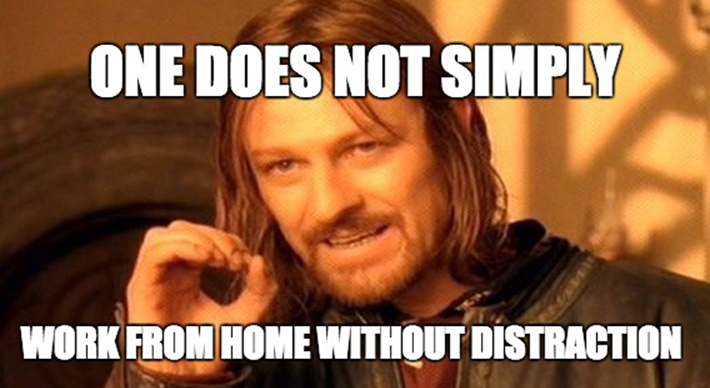
Treat yo' self
No matter what your job is I can pretty much guarantee that there's something about it that doesn't dazzle your senses. Whether it's writing reports, responding to emails, debugging a program... whatever, there's likely something that makes you feel less than stellar while doing it.
If you can't outsource it or get it off your plate, then I've found that the best way to motivate yourself to get it the hell done and off your plate is: rewarding yourself for your hard work, of course!
Basically you do this: "if I complete ______ (blog content, brand audit, etc) then I can _______ (watch the latest American Horror Story, have a glass of wine, go for a walk)."
I make a deal with myself in order to light a fire under my own ass and motivate myself to get it done, so that I can move on to the more appealing things I'd rather be spending my time doing.
Use weekly and monthly planners
Currently I'm using my iCalendar to keep track of all of my business and personal stuff - be that blog content, client deadlines, meetings, the #SocialHour Twitter chat, newsletters to send out... whatever I have coming up, it's in my calendar.
Sometimes it can be overwhelming to look at, but it means that I never miss a deadline, and I know exactly what I need to get done each day/week/month. However, if you find looking at a monthly calendar to be overwhelming (as I do) having daily and weekly checklists and to-do lists can go a long way in helping you stay on top of everything that you need to get done.
Want to get started on your organization and mega-productivity journey? No problem! When you sign up for my newsletter I'll send you an editable PDF Daily and Weekly Planner for you to save on your desktop and use every day, or (my favourite) print it off, laminate that SOB, and use cute markers to cross off those to-dos.
3 Things to do Before Breaking Out on Your Own
- by Alyson Shane
Well, I made it.
It's 2016, my business hasn't fallen apart, and my life didn't somehow implode in on itself. Yay!
Without a doubt, starting my own business and making the transition from being a full-time employee to a full-time business owner was scary as hell. There isn't really a "right" way to make the jump, and there aren't really a specific set of steps that you absolutely 100% must take in order to do it. However, there are a few key things to keep in mind before you break out on your own, which I want to discuss in this post.
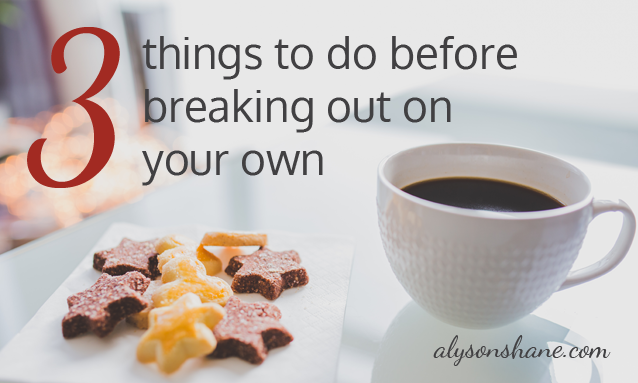
Why do I want to talk about this stuff? Because sharing is caring, and because I was lucky enough to have a wonderful and very clever guide (my boyfriend, John) who helped me navigate a lot of hurdles and helped me prepare for this experience.
Not everyone starting their own business is fortunate enough to have a John in their life, so here are a few things he taught me which I think will help you out if you think that running your own business is the path that you want to take:
1. Start Hustling Early
I got my first client a full year before I started working for myself full-time. Honestly, it happened by accident (I met a guy I knew from Twitter at a party who introduced me to his friend who needed a copywriter) and it wasn't for much, just a few copywriting articles each month. It didn't make a lot of money off that first client, but the experience of working with someone for a while helped me start to understand the dynamic of different kinds of working relationships which were different than the boss/employee relationship I was used to.
Also, starting small has allowed me to scale my business in a manageable way. I've acquired a handful of regular clients who I work with on a monthly basis, as well as some copywriting work, and one-off contracts for special events or websites as they come up.
I should also point out that I have been extremely lucky. What happened to me isn't always the case, and it's not realistic to assume that just because you go into business for yourself, that clients will start pouring out of the woodwork right away.
Not just that, but securing an ongoing contract (if that's what you're looking for, some businesses operate on a per-contract basis) often takes time. The process from the initial email or meeting to signing a contract can take months to happen, or never materialize at all.
By starting to build a client base early, you can get a feel for whether or not running your own business is actually what you want to do before you jump feet-first into doing it. Also, leaving your secure 9-5 knowing that you already have a handful of contracts to take care of your living expenses goes a long way in helping make the transition less scary. Trust me on this one.
2. Buckle Down
Assuming that you're working a 9-5 job in addition to building your business, you're going to be insanely busy trying to juggle both before breaking out on your own. Get used to it.
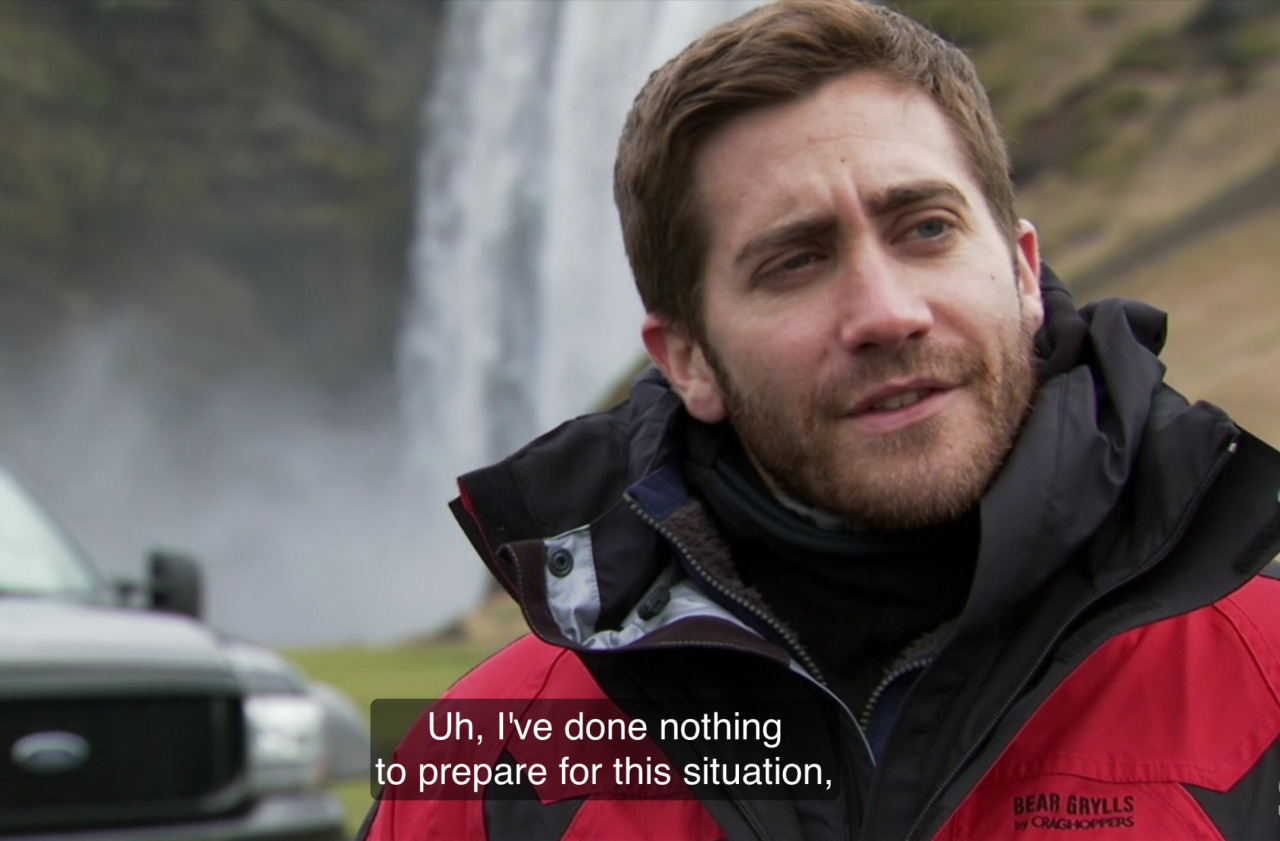
Before I left my office job I was working most weeknight evenings from 6-11 or 12, and spending a lot of time working on the weekends, as well. If you're trying to build up a decent client base to help you make a smooth transition, then obviously any time spent doing that work needs to be done outside of regular office hours (unless your boss is cool with this, which most aren't.)
If you want to work for yourself, you need to get ready for a very imbalanced work/life lifestyle for a while. Not just before you leave your 9-5, but afterward, too. To illustrate: I'm writing this on a Sunday evening, after working all day since I got up. I've also been on "holiday" since Christmas Eve, but have spent at least 5 days of my 10-day 'holiday' working for the majority of the day (who told you that running your own business was glamorous?)
What's crazy is that what I just illustrated isn't that uncommon; lots of people I know work even more than I do! But when you run your own business you're the only person responsible for generating your own income, and the sooner you get used to working aggressive and unusual hours, the better.
3. Save Up
Without a doubt the most terrifying thing about working for yourself is the transition from going to having a regular paycheque which is deposited into your bank account every two weeks, to one where your financial situation is in a state of flux.
I try not to talk too much about my financial situation, but in the interest of learning from my experience, here's how I managed to get myself into a relatively good position:
When I got my first contract (the small copywriting one I mentioned earlier) I used it to start paying down my credit card debt and the student debt that I'd acquired while in university. As I picked up more clients and started to think more seriously about running my own business as an option, I started splitting my additional income (ie: the money I was making above what I was paid at my office job) between paying down my debt and putting it aside in a nest egg.
Having a nest egg allows me to not freak the hell out when a payment is late (which happens) because I still have a float to live on for a while. Honestly, this "float" is the key to running your own business and not being in a constant state of panic. This all changes when you start bringing subcontractors and employees into the mix, of course, because they have to be paid before you do, but that's a whole different kettle of fish (and anxiety) that we won't go into here.
One last thing about money: get your taxes in order. If you live in Canada and you run a business making over $30,000/yr you must register for a General Sales Tax (GST) number. Dealing with the Canada Revenue Agency is a hassle (believe me) but if you aren't filing your taxes correctly you can wind up owing tens of thousands of dollars. Speak to your bank or accountant, if you've got one, and make sure you're covered.
Do you have any tips for people thinking about breaking out on their own? Tell me in the comments!


